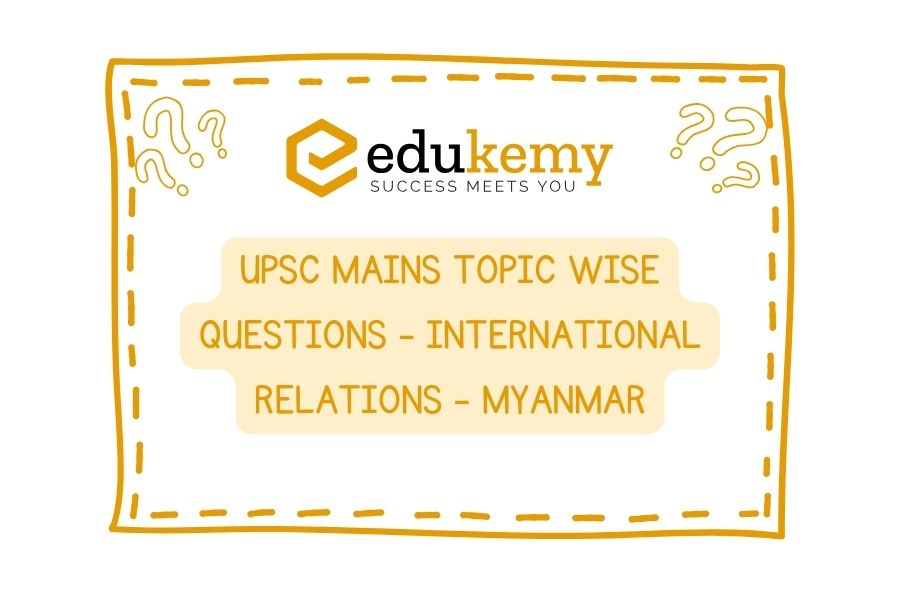Explore comprehensive UPSC Mains Topic Wise Questions focusing on International Relations with a spotlight on Myanmar. Delve into nuanced queries tailored to enhance your understanding of Myanmar’s diplomatic dynamics, geopolitical strategies, and socio-political landscape. Dive deep into the intricate web of international relations, analyzing Myanmar’s role, challenges, and evolving relationships with neighboring nations and global powers. With a structured approach to studying UPSC Mains topics, immerse yourself in insightful inquiries that enable a profound grasp of Myanmar’s significance in the global arena. Unlock the complexities of international diplomacy and enrich your preparation with targeted questions designed to refine your comprehension and analytical skills.
Contents
- 1 Q1. Write about Military rule in Myanmar. (2005, 10 marks)
- 2 Q2. Write in about 50 words about Sino – Myanmar relations. (2009, 5 marks)
- 3 Q3. Examine the recent developments towards the solution of the Bangladesh – Myanmar maritime boundary dispute. What implications do these have for India. (2010, 12 Marks)
- 4 In case you still have your doubts, contact us on 9811333901.
Q1. Write about Military rule in Myanmar. (2005, 10 marks)
Answer: Myanmar’s Military Rule (1962-2011): A Legacy of Authoritarianism and Stagnation
For nearly five decades, Myanmar’s military ruled the country with an iron fist following a 1962 coup. This period was marked by:
- Authoritarianism: The military junta ruthlessly suppressed political dissent, rigged elections to maintain control, and severely restricted civil liberties.
- Economic Stagnation: The junta’s pursuit of isolationist socialist policies led to economic inefficiency, widespread poverty, and a decline in foreign investment.
- Ethnic Conflict: The government’s dominance by the Bamar ethnic group fueled tensions and armed conflicts with various minority groups seeking autonomy.
The military began loosening its grip in the late 2000s, culminating in a flawed 2010 election and the establishment of a nominally civilian government. However, the military retained significant power behind the scenes and continues to influence political and economic affairs in Myanmar.
Q2. Write in about 50 words about Sino – Myanmar relations. (2009, 5 marks)
Answer: Sino-Myanmar relations have strengthened since the 1950s, marked by economic cooperation, infrastructure projects, and military collaboration. China’s investments in Myanmar’s energy sector and the strategic significance of the China-Myanmar Economic Corridor demonstrate their deepening bilateral ties, although issues like ethnic conflicts and border disputes persist.
Q3. Examine the recent developments towards the solution of the Bangladesh – Myanmar maritime boundary dispute. What implications do these have for India. (2010, 12 Marks)
Answer: Recent Developments (2010):
- The Bangladesh-Myanmar maritime boundary dispute remained unresolved in 2010. Negotiations based on the UN Convention on the Law of the Sea (UNCLOS) were ongoing.
- The Permanent Court of Arbitration (PCA) verdict on the Bangladesh-India maritime boundary dispute in 2004 offered a potential model for peaceful settlement through international law.
Implications for India:
- Positive: A peaceful resolution between Bangladesh and Myanmar sets a precedent for resolving India’s own maritime boundary dispute with Bangladesh, potentially through UNCLOS or the PCA.
- Strategic Concerns: Increased exploration and exploitation of resources in the Bay of Bengal by Bangladesh and Myanmar could lead to competition for energy resources, particularly with China.
- Security: A stable Bay of Bengal with clear maritime boundaries benefits regional security, potentially reducing piracy and illegal fishing.
However, uncertainties remain:
- The nature of the Bangladesh-Myanmar agreement (equidistance or equity principle) could influence India’s negotiations with Bangladesh.
- The potential for hydrocarbon discoveries in the disputed zone might complicate future agreements.
India’s Response:
- India should actively engage with both Bangladesh and Myanmar to ensure a peaceful resolution that considers its own strategic interests.
- Collaboration on joint development of resources in the Bay of Bengal could be explored.
Conclusion:
The Bangladesh-Myanmar maritime dispute resolution offers an opportunity for India to promote regional stability and secure its own maritime interests through peaceful negotiations and strategic partnerships.
In case you still have your doubts, contact us on 9811333901.
For UPSC Prelims Resources, Click here
For Daily Updates and Study Material:
Join our Telegram Channel – Edukemy for IAS
- 1. Learn through Videos – here
- 2. Be Exam Ready by Practicing Daily MCQs – here
- 3. Daily Newsletter – Get all your Current Affairs Covered – here
- 4. Mains Answer Writing Practice – here


